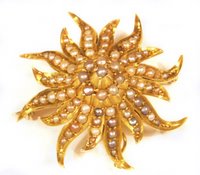 Angry traders confront eBay
Angry traders confront eBayCounterfeit goods are rampant on the Internet, and buyers using online auction sites like eBay are especially vulnerable. Artwork, jewelry, designer accessories, autographed sports memorabilia and other collectibles are popular among counterfeiters.
Fakes are sold everywhere, but the anonymity and reach of the Internet makes it perfect for selling knockoffs. And eBay, the biggest online marketplace, is the center of a new universe of counterfeit with virtually no policing.
EBay, based in San Jose, Calif., argues that it has no obligation to investigate counterfeiting claims unless the complaint comes from a "rights owner," a party holding a trademark or copyright. A mere buyer who believes an item is a fake has almost no recourse.
Nevertheless, eBay traders who have been burned are fighting back. The New York Times tells how.
Related: Tips to spot knockoffs
Tags: eBay, Auctions, Online Auctions, Auction Scams, Media by Sistrunk
2 comments:
Darn. I hate it when a link requires one to sign up to see the article. I just won't do it, even if they are free. Adds spam to my mailbox most times (yes, I have followed and signed up for these before).
I love to shop on eBay, but "Let the Buyer beware" is only common sense there as well as anywhere one shops.
And, let's face it...for the most part, people are always hoping to get a good, inexpensive deal. That doesn't mean the sellers should be ripping people off, but another take on it is the seller is hoping to make "more" on the sale than it's worth, and the buyer is hoping to buy for "less" than it's worth. So, is there really a rip-off?
Kate, interesting points. I've been trying to get my son, whom I consider to be an eBay guru, to write a story about his experiences. If you'd like to learn more about the NYT story, email me.
Post a Comment